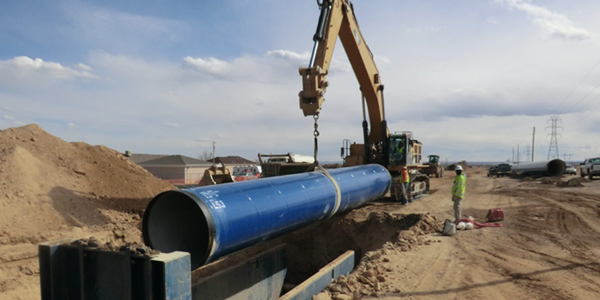Eminent Domain Abuse Continuing Along Ohio Pipeline Route
1851 Center stops abuse in Licking County, offers free assistance to property owners threatened with taking of property by private pipeline corporation
Columbus, OH – The 1851 Center for Constitutional Law today condemned a private pipeline corporation’s continued assertion of legal authority to take Ohioans’ private property for its own benefit, and threatened litigation, should the corporation not discontinue. In addition, the Center (1) made public its analysis demonstrating a lack of such authority; (2) disclosed that the corporation has immediately backed down from its threats once confronted with 1851 analysis; and (3) offered free legal representation to all owners threatened with a taking of their private property.
Enterprise Liquid Pipelines, a Texas-based corporation amongst the world’s largest pipeline companies, to construct the Appalachia to Texas (“ATEX”) Pipeline across the state, claims that it — by itself and without government approval — can take Ohioans’ homes and land pursuant to an arcane Ohio statute. Enterprise is relying on Ohio Revised Code Section 1723.01, which at first blush appears to permit certain private pipeline companies to “appropriate so much land. . . as is deemed necessary. . . for the laying down of pipes.”
In a November 27, 2012 formal statutory notice to farmer Dave Bonifant, Enterprise threatened “the property you own . . . is within the proposed route of the pipeline,” “Enterprise will exercise its eminent domain authority to appropriate your property,” and “Enterprise will exercise its eminent domain authority through a court proceeding if you and it are unable to reach an agreement.” In the same letter, Enterprise claimed that the fair market value of Mr. Bonifant’s property was just “$5,500.”
In its December 17, 2012 response on behalf of Mr. Bonifant and several others, the 1851 Center exhaustively outlines why the Ohio Constitution denies appropriation authority to the pipeline project.
The 1851 Center’s legal memorandum includes the following analysis:
- R.C. 1723.01 does not apply to ethane pipelines. While R.C. 1723.01 authorizes the use of eminent domain, in some cases “for transporting natural or artificial gas, petroleum, coal or its derivatives, water, or electricity, through tubing, pipes, or conduits,” etc., the ATEX pipeline does not transport any of these. Rather, it transports ethane, which Enterprise describes as a “liquid,” that is “derived from the natural gas extraction process.”
- ELP, through the ATEX, is not a “public utility.” Due to Senate Bill 315’s amendments to R.C. 4905 in June of 2012, ELP is clearly not a “public utility.”
- The Ohio Constitution requires that any taking of property be for “public use.“ The Ohio Supreme Court has explained that “even under * * * a deferential standard * * * public use is not established as a matter of law whenever the legislative body acts.” Instead, “defining the parameters of the power of eminent domain is a judicial function, and [Ohio courts] remain free to define the proper limits of the doctrine.”
- Economic benefits to private interests are not “public uses.” In Norwood v. Horney, the Supreme Court of Ohio recently affirmed private uses for private gain are not public uses, explaining “we have never found economic benefits alone to be a sufficient public use for a valid taking;” “[t]o justify the exercise of eminent domain solely on the basis of the fact that the use of that property by a private entity seeking its own profit might contribute to the economy’s health is to render impotent our constitutional limitations on the government’s power of eminent domain;” “economic development by itself is not a sufficient public use to satisfy a taking;” and “[w]e hold that an economic or financial benefit alone is insufficient to satisfy the public-use requirement of Section 19, Article I. In light of that holding, “any taking based solely on financial gain is void as a matter of law.” Thus, the economic benefits of the ATEX Pipeline alone would not appear to justify appropriation of private property.
- The public will not possess or otherwise use the ATEX Pipeline.In Pontiac Improvement Co. v. Board of Com’rs of Cleveland Metropolitan Park Dst., the Supreme Court of Ohio indicated that “the use must always be a public use, and the land or the interest therein must be taken by the public. Where private property is taken against the will of the owner under the power of eminent domain, it is a prerequisite that possession, occupation, and enjoyment of the property by the public, or by public agencies, is sought and is necessary;” and “‘[p]ublic use means the same as use by the public.” The ATEX, however, will not be possessed or used by the public, but will instead be privately owned, operated, and possessed, solely for the benefit of Enterprise and several large natural gas producers.
- Taking property to advance the ATEX Pipeline is not “necessary.”In addition to being for a “public use,” the Ohio Constitution requires that takings be “necessary.”Similar pipelines are being built in Ohio without the use of eminent domain. As the Supreme Court of Ohio explained in Cooper v. Williams, “[i]t is only this great and common benefit to all the people alike that creates a necessity authorizing and justifying the seizure.”
In response to this analysis, Enterprise has refrained from following through with the threatened legal action against Licking County property owners. Instead, Enterprise responded by first offering Mr. Bonifant a six-figure dollar amount for his “$5,500” property before altering the route to avoid Mr. Bonifant’s property altogether, as he had consistently requested.
However, Enterprise continues to use the threat of eminent domain to gain leverage over Ohioans along the ATEX route.
“Ultimately, any Ohio statute attempting to convey eminent domain authority to a purely private corporation should be repealed. The entire purpose of a constitution is to prevent government from taking private property from the politically weak and transferring it to well-connected special interests. Yet that his precisely what this statute enables,” explained 1851 Center Executive Director Maurice Thompson. “The abuse along the ATEX is a prime example of what can happen to Ohio property owners when such a statute remains on the books.”
“And while we fully support this pipeline project, and the continued development of oil and gas reserves in eastern Ohio,” continued Thompson, “the very thing that makes private enterprise possible is respect for private property rights – – the Ohio Constitution does not enable private parties to take Ohioans homes and land, simply to improve their own profit margins.”
The 1851 Center draws a distinction between takings for pipelines facilitating home heating or energy independence and pipelines for purely private commercial interests. While public utilities may exercise eminent domain to provide service to Ohioans homes, and certain oil and gas pipelines may even possess eminent domain authority, the ATEX is set to haul Ethane — a chemical byproduct of fracking later used to manufacture consumer plastics — across the state. ELP intends to save money by constructing a pipeline rather than channeling the ethane to their Texas-based facilities by truck or rail. The pipeline remains submerged through the entire state, provides no service to Ohioans, and maintains the same legal status as would a pipeline for milk, bottled water, or chocolate.
“At minimum, Enterprise is using the false threat of eminent domain to intimidate Ohio property owners into accepting below-market settlements for their land,” added Thompson. “Ohioans should be aware of this ploy.”
Compounding the matter, in a March 28, 2012 letter to property owners, Enterprise claimed to have eminent domain authority by virtue of its status “as a public utility.” However, Senate Bill 315, enacted in June of 2012, clarified that such operators are clearly not public utilities. Enterprise has not corrected itself and nevertheless continued to threaten homeowners who may have been misled as to Enterprise’s status.
Meanwhile, many eminent domain attorneys hired by property owners have incentives to work in implicit cooperation with the pipeline: a typical attorneys fees agreement to negotiate a pipeline taking provides that the attorney is only paid if the client eventually sells his or her property to the pipeline company. Accordingly, many attorneys summarily advise their clients that Enterprise does indeed maintain eminent domain authority, and that they have no choice but to sell.
The ATEX is set to begin in Jefferson County, Ohio, along the Ohio River, and after crossing the state south of Columbus, exit Ohio through Butler County.
The 1851 Center is offering free representation to homeowners who object to the taking of their private property by Enterprise.
Read the 1851 Center’s full legal memorandum to Enterprise Liquid Pipelines HERE.

April 1, 2013: Farm and Dairy: Licking County landowner fights pipeline and appears to have won
February 2, 2013: The Buckeye Lake Beacon: Help offered to pipeline opponents
January 23, 2013: Ohio Watchdog: Ohio lawyer offers free aid to stop pipeline land seizures












Leave a Reply
Want to join the discussion?Feel free to contribute!